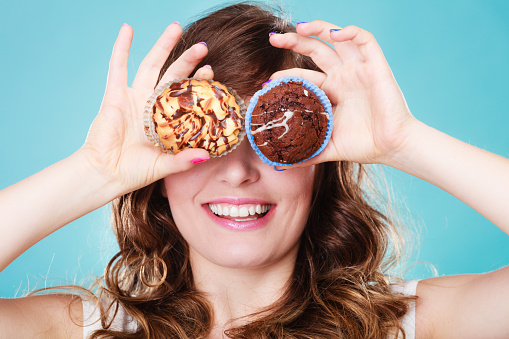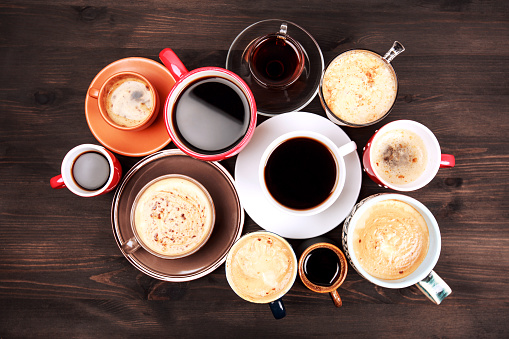9 Office Habits to Avoid for Weight Loss
Article posted in: Lifestyle
If yours is anything like ours, the office is like one big trap that can negatively affect your weight loss.
Scary stuff considering that most Americans spend more of their waking hours at work than anywhere else. All that office time isn’t just giving you money, it could also be giving you fat.
According to a study, the average American worker spends 47 hours per week at work—a little more than nine hours per day. If you’re sleeping seven hours each night, that’s still an hour more than you’re spending not at work. That office time could be making your weight loss journey harder.
Healthy hint: A Nutrisystem plan goes perfectly with your busy schedule because all of the weight loss meals and snacks are healthy and perfectly portioned, so you don’t have to worry about getting stuck in a trap.
Avoid these nine office habits and stay on track to your weight loss goal:
1. You clock in and stay glued to your chair.
You may have heard that “sitting is the new smoking,” and that’s because the average American under the age of 60 spends six to eight hours per day sitting, according to the American Heart Association. That amount of sedentary time increases risk for chronic disease and even death, and if it’s interrupted, it can keep your body from burning fat. Scientists at the University of Missouri found that enzymes in the blood vessels of your muscles that are responsible for burning fat actually “shut off” within a few uninterrupted hours of sitting.
So get up! Walk to talk to a coworker instead of messaging them on email, walk to get a glass of water. In one study at Stanford, researchers found that people who walked on a treadmill or path outside gave more creative responses on a test designed to measure creative thinking than those who took the test while seated.
2. You eat lunch at your desk.
Same idea, but working through lunch actually compounds all-day sitting by making your lunch less satisfying. Multiple studies have shown that “mindful eating,” where weight loss dieters focus on being aware of the food they’re eating and the act of eating it, has helped people lose weight without focusing on calories. No need to ask, “How many calories should I eat to lose weight?” Eating while distracted means you’ll need more saltiness, more sweetness and more crunch to feel satisfied with their food.
To try this practice, put your work away while you eat: Switch off your monitor, put your phone down and focus on the colors, flavors and textures of your midday meal. You could be less hungry in the afternoon and could also help your blood sugar. In a three-month study from Ohio State, patients with Type 2 diabetes significantly lowered their blood sugar through this technique.
3. Group lunches at a local restaurant.
Heading out with coworkers can be a great way to network, blow off steam or just take a pleasant break from the office. However, be mindful that restaurant portions can be much bigger than your weight loss plan allows—and you might not recognize it. According to a study in Nature, Americans correctly guess the amount of food in a portion only about half the time. (Nutrisystem is known for offering perfectly portioned meals so you don’t have to guess.)
If you can, be prepared: Look up the menu (and calorie count) online before heading out, so you know what fits your plan before you arrive. If the calorie count isn’t available online, know that most restaurant portions are too big by about half: Cut your order in half right when it arrives and plan to take the rest home.
4. You skip lunch.
It may seem like a great way to cut a bunch of calories and get back on track, but skipping a meal can cause your metabolism to slow, according to Nutrisystem weight loss dietitians. Translation: Your body is burning fewer calories at rest, so while you may have eaten less, you’re shedding less in the long run.
Nutrisystem dietitians suggest eating every three to four hours to maintain energy, keep blood sugar steady, and keep your metabolism churning at full steam.
5. You start the day with a big, creamy latte.
Even with two percent milk, a large latte from a popular coffee chain can have 250 calories—more than half of what most weight loss diet plans recommend you get from your whole breakfast.
If you need a boost, stick with black coffee. It could actually help you burn more calories. Some foods are thought to increase thermogenesis—the production of heat in the body—and this results in increased calorie burn. Caffeine was found to boost thermogenesis in one study from 2012, meaning that if you drink it, you’ll be burning more calories than if you didn’t. The study also notes that caffeine could give you more energy, so the added calories burned may be offset by this energy.
6. You don’t keep a water bottle at your desk.
When you’re dehydrated, researchers at the University of Utah say your body can burn up to two percent fewer calories at rest. Also, your mind often signals “hungry” when you’re really just thirsty, so not drinking water during the day can make you feel like you want a diet-busting snack, when in reality all you need is a cold sip.
Keeping water at your desk can also help enhance your weight loss efforts: In one 2003 study, scientists found drinking two liters of water daily can increase your calorie burn by 400 per day. That 400-calorie difference means you could lose a pound in less than two weeks—even if you changed nothing else. If you have the water before lunch, even better: In a study from Virginia Tech, subjects who drank two eight-ounce glasses of water before weight loss meals lost 36 percent more weight over a 12-week period than those who didn’t drink. That could also be because the subject seems were fuller from the water and couldn’t eat as much.
7. You keep a dish of candy on your desk.
It’s nice for people that come in for a meeting, but bad for your waist line. When temptations are close by, you’re more likely to indulge: In a study involving a candy dish, scientists found that people ate 1.8 more pieces of candy per day when the bowl was placed on their desk as opposed to two meters away. So do away with the dish or share the candy in a common area instead.
8. It’s your coworker’s birthday … and there’s cake.
Remember how Americans are bad at eyeballing portions? The same study found that they’re even worse when judging portion sizes of snacks and sweets. So if you’re going to join the celebration, be aware—grab a small piece that fits your plan and savor it, eating mindfully to maximize satisfaction. Or better yet, enjoy one of your sweet Nutrisystem treats while everyone else indulges. If you have trouble with willpower, check in with your weight loss goals before going.
9. You deal with stress by snacking.
When the afternoon blahs hit—or a deadline looms—the vending machine starts calling your name. However, the snacks behind the glass won’t help you feel satisfied: They’re carb-heavy, nutrient-lacking snacks that will only make you crash soon after.
Nutrisystem dietitians recommend eating a snack that combines fiber with some healthy fats. Both of these nutrients will help you feel full fast and stay feeling full longer. Both can help you lose weight faster, too. Try pairing an apple with a low-fat string cheese or cut veggies with a measured portion of hummus. Eat mindfully, so you’ll feel more full and then, if you can, step outside for a moment: A dose of sunlight can increase your levels of serotonin, a “happy” hormone. You’ll return to your desk full, refreshed and ready to tackle anything.















